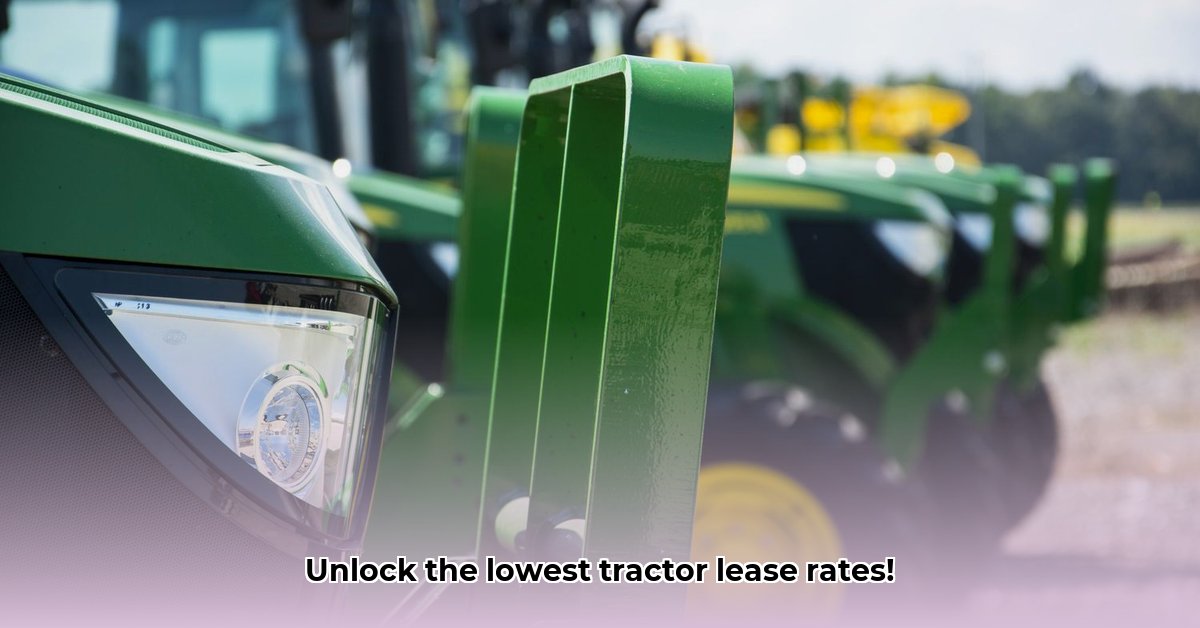
Thinking about renting a tractor? Understanding the hourly cost is crucial for managing your farm's budget effectively. This guide breaks down tractor rental rates per hour, helping you make informed decisions and avoid unexpected expenses. For more detailed information on tractor leases, check out this helpful resource: tractor lease options.
Factors Influencing Hourly Tractor Rental Costs
Several key factors influence the hourly rate you'll pay for tractor rental. These factors are similar to those affecting car rentals, but with an agricultural twist.
Horsepower: Higher horsepower tractors, capable of handling larger fields and heavier tasks, command higher hourly rates due to increased equipment cost and performance capabilities. A 200+ horsepower tractor will naturally cost more than a 40-50 horsepower model.
Age and Condition: Newer tractors with advanced technology typically have higher hourly rates than older, well-maintained models. Think of it like renting a new car versus a used one – the newer model comes with a premium.
Technology: Advanced features like GPS guidance systems and automated functionalities significantly improve efficiency, but also increase rental costs. This reflects the technology's value in reducing operational time and ensuring precision.
Location and Season: Rental rates fluctuate with location and seasonal demand. Peak planting and harvest seasons usually see higher rates due to increased demand in regions with strong agricultural activity. This aligns with supply and demand principles; high demand equals high prices.
Understanding Your Tractor Lease Agreement: Crucial Details
Before signing, thoroughly review the lease agreement. Don't overlook the fine print; a careful review can prevent unexpected costs. Pay close attention to these points:
Maintenance and Repairs: Clearly define responsibilities for maintenance and repairs. Will you handle minor issues, or is the rental company responsible for all maintenance? This clarity prevents disputes later.
Insurance: Confirm whether insurance is included in the hourly rate or is an extra charge. Also, understand the level of coverage provided. This ensures you're protected against unforeseen circumstances.
Fuel: Determine who is responsible for fuel costs—you or the rental company. This transparency is key to accurate budgeting.
Estimating Your Total Tractor Rental Costs: A Step-by-Step Approach
Accurately estimating rental costs requires a structured approach:
Define Needs: Specify the required tractor size (horsepower), essential features (GPS etc.), and estimated usage hours. This precision ensures you rent the right tractor for your tasks.
Obtain Quotes: Contact several local equipment rental businesses and compare quotes in writing. Don't settle for the first offer; shop around for the best deal. Comparison shopping is crucial for optimal pricing.
Factor in Additional Costs: Budget for fuel, routine maintenance, and potential repairs. These add-on costs are substantial and must be incorporated into your calculations. Accurate budgeting is crucial for smooth operations.
Calculate Total Cost: Sum up the hourly rental rate, fuel, maintenance, and potential repair expenses to arrive at the total rental cost. This comprehensive approach ensures you're aware of all costs.
Sample Hourly Tractor Lease Rates: A Range of Possibilities
Providing precise rates is challenging due to variations in location, tractor type, and condition. However, these approximate hourly rates (USD) offer a general idea:
| Tractor Type | Horsepower | Approximate Hourly Rate (USD) |
|---|---|---|
| Small Utility Tractor | 40-50 | $30 - $50 |
| Medium-Sized Tractor | 75-100 | $50 - $80 |
| Large Row-Crop Tractor | 200+ | $100 - $150 |
Note: These are estimates only. Actual costs can vary significantly.
Tips for Saving Money on Tractor Rentals
Several strategies can help reduce rental expenses:
Consider Used Tractors: Older, well-maintained tractors can offer significant cost savings compared to new models. This approach offers efficiency without the premium of a new tractor.
Short-Term Rentals: If needed for a short period, short-term rentals might be more cost-effective than long-term leases. This strategy avoids unnecessary expenses.
Negotiate Rates: Don't hesitate to negotiate with rental companies, especially for extended rentals or with a strong credit history. Negotiation can often unlock better deals.
Shop Around: Compare prices from multiple rental businesses to identify the most favorable offer. This due diligence yields the best pricing.
Beyond the Hourly Rate: A Holistic Perspective
Remember, the hourly rate is just one aspect. Consider fuel, maintenance, repairs, and insurance for a complete cost picture. Thorough planning ensures a productive and financially sound rental experience. Proactive budgeting and research are essential for success.